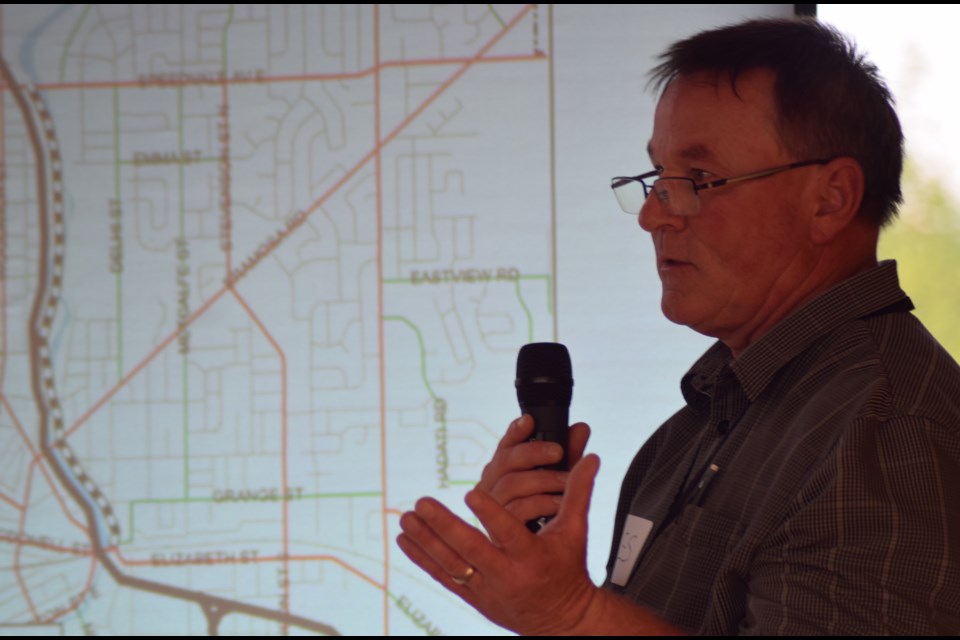The complexities and contradictions of weed-control on railroads were evident at a public meeting Thursday night. The subject may not sound terribly compelling, but it has many in the city up in arms.
Ward 2 city councillor James Gordon arranged the meeting with city officials after concerns mounted over Guelph Junction Railway’s use of strong herbicides to kill weeds on the city-owned tracks. About 40 people showed up at Guelph Youth Music Centre to hear how the city and its weed-control contractor Green Stream were going to address concerns. About half of those in attendance live near the tracks.
Peter Cartwright is Guelph’s interim CEO of GJR, and the city’s general manager of business development and enterprise. While there were opinions voiced at the meeting that suggested some residents don’t trust the city to do the right thing, Cartwright attempted to quell those feelings.
He said it was decided to hold the meeting so that officials could better understand the concerns of citizens.
“We want to do maintenance on the tracks in a way that doesn’t compromise your interests,” he said, adding that city hall is trying to “do things better” through community outreach and effective communications, and not to “sell you a bad bill of goods.”
But at the same time – and this is clearly one of the complexities – Guelph is obligated to clear the tracks it owns in compliance with Transport Canada regulations. It must find an effective way to control weeds, and soon.
Green Stream began spraying a combination of three herbicides, Roundup among them, on the tracks earlier this month. The operation was temporarily halted when many living near the tracks complained that the herbicides were too dangerous to be used near trails and backyards.
It appears residents at Thursday’s meeting had the expectation that the spraying had been postponed, but that was not the case. One person at the meeting witnessed spraying near Ferguson Street on Wednesday, with no signage warning of it. Green Stream owner Steve Ford confirmed that spraying was carried out.
The problem of keeping the tracks clear is a complex one for a municipally owned track, the citizens hear. Guelph is one of only two municipalities in Canada that owns a railway.
While a private company like CN can spray at will, without notice or without justifying its use of chemicals – which it recently did along parts of its tracks in Guelph – the city has to post notices and explain its approach.
Les Petroczi, GJR general manager, said control weeds is critically important, but it is not easy. Crews can use a weed-whacker to cut them back, but the practice can only make them hardier. And it doesn’t touch the root. Perennial weeds keep coming back.
Weeds undermine the stability of track ballast by retaining moisture and preventing run-off. Ties deteriorate much faster in such cases, and that is true for GJR.
Petroczi indicated there is an urgency to get “a lot of maintenance done soon” for a host of reasons. Among those reasons is the long-term structural integrity of the line.
He showed photographs of areas of the track where weeds were so thick they were making the rails disappear. Such conditions make inspections difficult and impede the ability of trains to stop.
Some in the crowd wanted to know why GJR does not simply continue to cut the weeds, which is an approved method of control. Francois Tardif, a weed scientist at the University of Guelph, said perennial weeds are difficult to control with cutting, and doing so is impractical. Herbicides, on the other hand, have longer-term effects, and can penetrate down to the root.
Mike Cowbrough, the weed management lead with the Ontario Ministry of Agriculture, Food and Rural Affairs, said he counted 14 different weeds species on GJR tracks. Eleven of those 14 can be controlled with the herbicide combination currently in use by GJR. Vinegar can be used to control some weeds, but the acetic acid in it, he said, kills only one of the 14 species.
One audience member pointed out that it is illegal for the city not to post signs when spraying the tracks. The fact that it was done contributes to the atmosphere of distrust many have towards GJR.
Petroczi admitted that “wires got crossed,” and he said he would look into why it happened, Cartwright said he understands why citizens are upset, and assured those present that the issue would be looked into.
